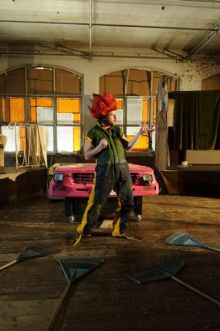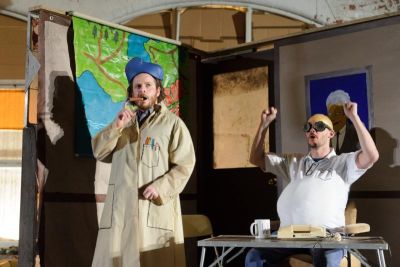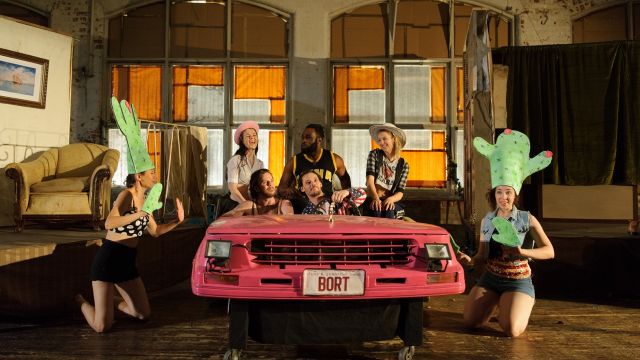Mr Burns, A Post-Electric Play
Anne Washburn’s thesis in her play is that in a post-catastrophe future, what people will hang onto and comfort themselves with will be their memories of television shows – or movies, or operetta or maybe theatre. Not books. Not even, from the evidence of this play, people’s own stories, the memories of their own lives, transmuted into ‘stories’. Maybe that’s an argument worth considering, but must it be considered at such inordinate length?
Mr Burns, A Post-Electric Playbegins in that already post-catastrophe, dystopian future. The disaster – a chain reaction of exploding nuclear plants, spreading fire and radiation – has already happened. Millions have died. Now a group of random survivors – Quincy (Jen Bush), Jenny (Tilly Legge), Matt (Dylan Watson), who seems to be more or less the leader at this point, Maria (Hannah Greenwood), Colleen (Emma Choy) and Sam (Victory Ndukwe) - are gathered around a campfire (electricity is long gone). They’re attempting to remember and piece together an episode of the animated sit-com/satire The Simpsons, specifically the episode ‘Cape Feare’, which riffs on and sends up the movie Cape Fear (Martin Scorsese 1991), starring Robert De Niro, a remake of an earlier Cape Fear (J Lee Thompson 1962), starring Robert Mitchum – and reference to Mitchum brings in The Night of the Hunter (Charles Laughton 1955) and… The psychopathic villain in Simpsons world is Sideshow Bob, but given the play’s title, the real villain is Mr Burns, the upholder of all that’s vile and heartless about capitalism – that has led to this.
It’s that sort of play: spotting the reference, pop culture or otherwise, is part of the pleasure of it – and my audience did seem to enjoy that – perhaps to the exclusion of what the play has to say about us and our compelling need to tell or see or listen to stories.

The group around the campfire is understandably paranoid. The world of Cormac McCarthy’s The Road may be just outside – but we don’t go there, it’s just implied. Indeed, how people survive in this world is taken for granted. How do they rebuild their world? Who treats people for radiation sickness? What do they eat? Yes, yes, I know those questions are beside the point, but all our characters do is tell stories.
Our initial group – who all turn out to be armed - is joined by a traveller, Gibson (Mark Yeates), the only character about whom we learn anything much of his past – that is to say, his story. He reports the chaos and destruction outside – and each character has a list of survivors they’ve met to compare with others. But that’s as if that sad stuff is ‘covered’ and we can get back to The Simpsons.
After a cunningly disguised scene change, we’ve jumped seven years and our group is now a band of travelling players whose schtick is performing whole Simpsons episodes including commercials. (For whom?) There are anxious and resentful references to other groups – one is a West Wing outfit, another, referred to with irritable dismissal, does Shakespeare. There are moments of real humour in this second act of the Simpson-ian kind, but it drags as the troupe members bicker and rehearse. An interesting exchange occurs when one character wants to inject some ‘meaning’ into a scene – and is roundly told off by another. My memory of this is something like, ‘”Meaning”? Meaning is all around us, but to make something meaningless – just entertainment – is really hard.’ Yes, it is really hard because it’s practically impossible. The Simpsons, in particular, is far from meaningless.
This idea of The Simpsons as ‘meaningless entertainment’ is repeated by director John Kachoyan in his lengthy program note and it’s nonsense. He includes a quote from Joan Didion that begins, ‘We tell ourselves stories in order to live.’ But what follows from Didion does not refer to the recreation of television shows, but to the shaping of our own life experiences and histories so as to make sense of them - because it’s a survival imperative: we can’t help ourselves, we do it to stay sane – even if we’re wrong.
In Act Three – after an even more elaborate, huge scene change, it’s 70 or 75 years later and a troupe of actors – not our original group – let’s say their heirs – presents a show that adapts, transmutes and echoes that original Simpsons ‘Cape Feare’ episode. Now Michael Friedman’s score and musical director Andrew Patterson really come into their own: the music is a witty pastiche (spot the reference).
The Simpsons episode gets mashed up with Greek tragedy, Gilbert and Sullivan (The Mikado), Beyoncé, Broadway musicals, The Night of the Hunter (still in the mix) - and did I see Cats? – and more - and makes of it an archetypal morality play – in which ‘Evil’ (what was Sideshow Bob) runs rampant… but ‘Good’ sort of triumphs. This is bold and adventurous: it is Ms Washburn’s speculation as to how we might tell stories to ourselves and others in a future that knows nothing first hand of our world now. Her speculation is inventive, clever and funny, but in the end its very cleverness left me melancholy. Is this mash-up the best that we’ll be able to do? That is, is this satire? Does the cleverness and humour mask the sadness?
 Watching this play somehow reminded me of the movie Fahrenheit 451 (Francois Truffaut 1966) in which books are outlawed – because they make people ‘unhappy’ – and a clandestine group, the ‘book people’ pace about in the woods, learning whole books by heart so that they will be preserved for the future. There’s a rather different agenda at play with Mr Burns.
Watching this play somehow reminded me of the movie Fahrenheit 451 (Francois Truffaut 1966) in which books are outlawed – because they make people ‘unhappy’ – and a clandestine group, the ‘book people’ pace about in the woods, learning whole books by heart so that they will be preserved for the future. There’s a rather different agenda at play with Mr Burns.
Mr Kachoyan says that Mr Burns is ‘not a play of plot or even characters, it’s one of ideas, and there are a lot of them.’ Well, Mr Kachoyan is a very good director – that much is obvious here – but while he’s right about the characters, I’m afraid I can’t agree about the ‘ideas’. I think there are a couple at best, stretched rather thin and not entirely convincing.
None of this is a reflection on the cast. They are excellent. Each brings their character to detailed life – and then bring more characters to life – ‘real’ and completely stylised. They sing – badly, but that’s the joke. They dance - likewise. They are occasionally touching and often very funny – even when the material is plodding, obvious or milked bone dry. They give their all to what could be a twenty- minute sketch. By the way, you don’t really need to be up on The Simpsons or all the other pop culture references but if you’re not you’re going to miss an awful lot.
Michael Brindley
Photographer: Sarah Walker
Subscribe to our E-Newsletter, buy our latest print edition or find a Performing Arts book at Book Nook.

